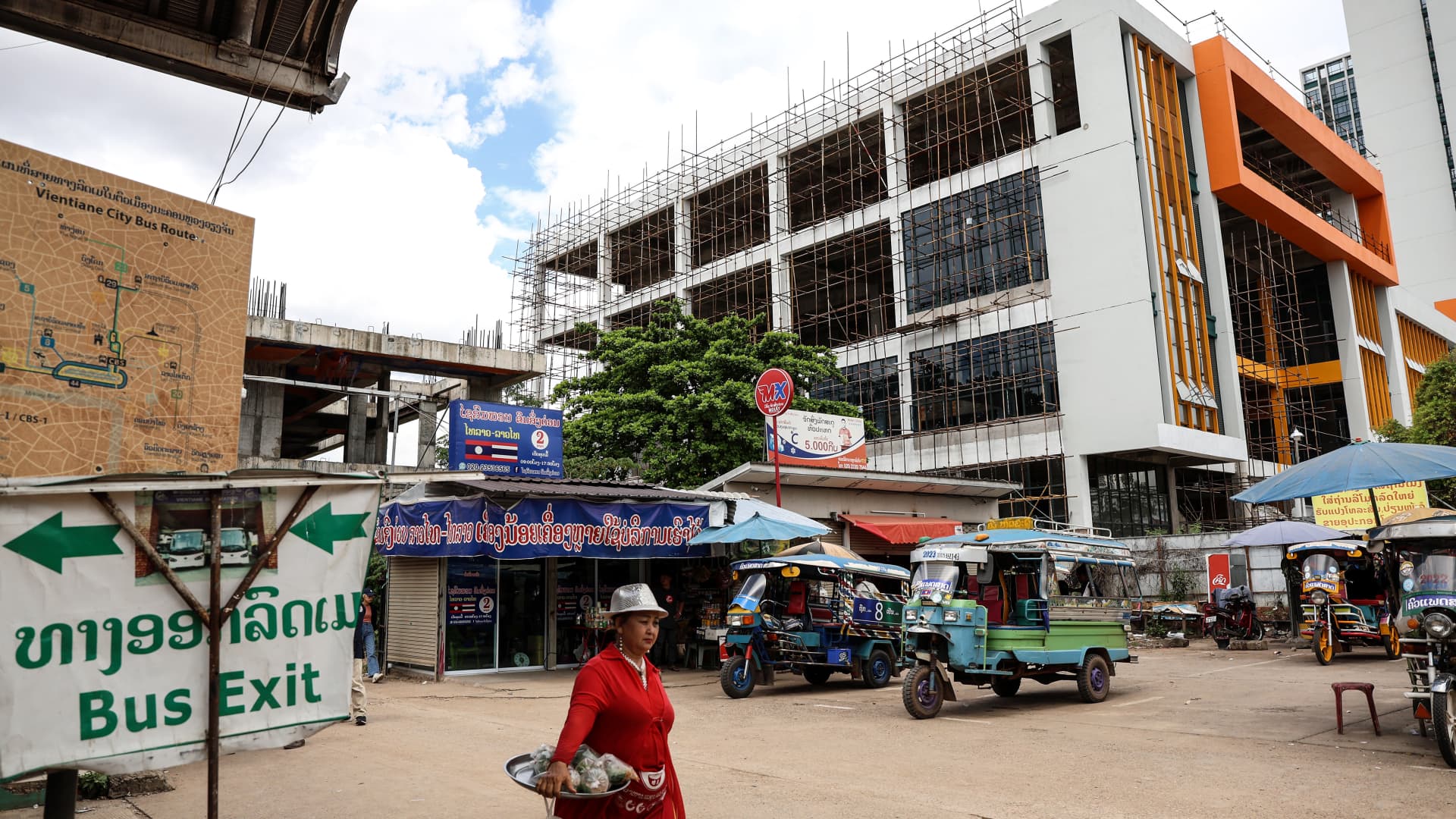Laos is spiraling toward a debt crisis as China looms large

A pedestrians at a bus station in Vientiane, Laos, on Saturday, June 24, 2023.
Valeria Mongelli | Bloomberg | Getty Images
An alarming debt crisis has unfolded in Laos in recent years, raising worries about the tiny nation’s obligation to its biggest creditor — China.
China became the largest foreign investor in Laos in late 2013 and since then, its influence has only continued to skyrocket.
A majority of Laos’ public debt, which the IMF estimates 122% of GDP this year, is owed to Beijing due to infrastructure deals under China’s Belt And Road Initiative, or BRI.
Laos borrowed billions from President Xi Jinping’s government to finance railways, highways and hydroelectric dams, depleting its foreign reserves in the process.
Combined with increasing food and fuel prices across the globe, plus a currency crisis — the Laotian kip has depreciated to record lows against the U.S. dollar, triggering soaring inflation.
It’s widely feared the country may be on the brink of economic collapse if the economic crisis spins out of control.
In response, the government has implemented several stability measures, including interest rate increases, bond issuances, and working with the Asian Development Bank on debt management practices. It has also reduced spending on critical services like education and health care.
But without a clear-cut debt reduction deal with China, Laos’ financial hardships will not likely ease, analysts warn.
“Laos should negotiate an upfront debt treatment with China, such as debt reduction in net present value terms, to enable Laos to meet debt services obligations sustainably,” said Toshiro Nishizawa, a professor at The University of Tokyo who focuses on economic policy.
Extended repayment periods and reduced interest rates are one option, he added, as is a climate-centric approach like debt-for-climate swaps, which would entail Laos committing to environmental policies in return for a haircut.
Short-term relief
China gave Laos significant near-term debt relief from 2020 to 2022, providing “temporary relief,” said the World Bank estimating that deferred repayments over those three years reached about 8% of Laos’ GDP in 2022. But the generosity of the world’s second-largest economy only extends so far.
“Given the approach China has taken previously, it may offer short-term relief, but only that,” said Mariza Cooray, a research fellow and senior economist in the Lowy Institute’s Indo-Pacific Development Centre, in a report published earlier this year.
CNBC has reached out to the Chinese foreign ministry for comment.
China needs to do more for Laos, and do it quickly.
Mariza Cooray
Lowy Institute’s Indo-Pacific Development Centre
“As with Sri Lanka and Zambia, China has also so far been unwilling to take a haircut on its debt, despite obvious signs that this will ultimately be necessary and to everyone’s benefit,” she wrote, adding that “China needs to do more for Laos, and do it quickly.”
It’s in Beijing’s best interests to prevent Laos from defaulting.
Strong China–Laos relations help Beijing’s position in Southeast Asia as Washington gains influence in the Indo-Pacific. Shared socialist ties between China and Laos is another factor.
Moreover, “Chinese banks do not want to become creditors burdened with non-performing assets, nor does China want to look like an unreliable lender to developing nations,” said Nishizawa. “China is unwilling and unable to let Laos default.”
‘Debt trap’ concerns
Some media reports have warned of a so-called debt trap — a scenario in which Beijing would seize valuable infrastructure assets in Laos — should the latter default or be unable to pay on time.
Concerns grew after state-owned energy company Électricité du Laos, which accounts for around 37% of Laos’ external debt, signed a 25-year concession agreement with China Southern Power Grid in 2021. The deal gave the Chinese state-owned enterprises (SOEs) a majority stake and the rights to export Laos’s electricity overseas.
But some experts have debunked fears of Chinese debt-trap diplomacy in BRI nations.
Researchers Deborah Brautigam of Johns Hopkins’ China Africa Research Initiative (CARI) and Meg Rithmire of Harvard Business School have pointed out that Sri Lanka, for instance, owes more debt to Japan, the World Bank, and the Asian Development Bank than to China.
“When debt distress strikes, we do not see Chinese banks attempting ‘asset seizure,’ and so far, no cases in Africa of international arbitration or involvement of courts, either,” CARI noted in a 2020 research paper.
“Instead, Chinese officials are trying to develop tailor-made solutions to address debt (and development) sustainability, case by case,” they said.
Ultimately, Laos must diversify its foreign investment but given its economic turmoil, it will be hard to achieve without a debt restructuring deal.
“A successful conclusion to ongoing debt renegotiations will be crucial,” said Pedro Martins, senior economist at the World Bank’s Laos office, referring to not just China but all of Laos’ creditors, which include major financial institutions.
In the meantime, Vientiane still has plenty of options at its disposal.
“This could involve tax reforms, including the reduction of excessive tax exemptions and improved tax collection on the revenue side,” said Harumi Taguchi, principal economist at S&P Global Market Intelligence.
“On the expenditure side, financial management reforms, including strict controls on repayment from SOEs and lending/guarantees to SOEs, would be key,” she said.
Improving expenditure efficiency, strengthening the financial sector and boosting the business environment while promoting exports are other solutions, added Martins.









